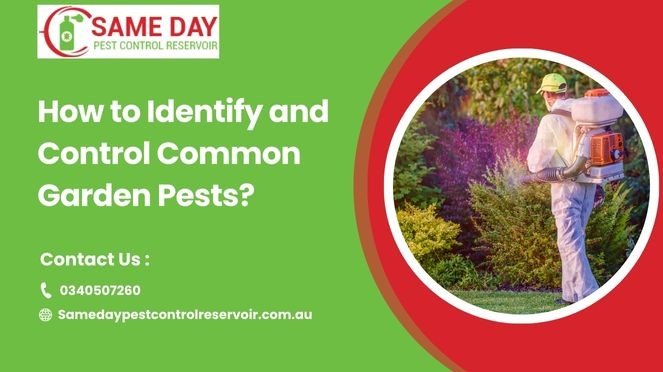How to Identify and Control Common Garden Pests?
Keeping a garden free of pests is a challenging task! Is there any method to make it possible for you? Indeed, you have plenty of options, such as companion planting, natural & chemical sprays to prevent bug infestation in your garden. Today, in this post, we are going to tell you how you can identify and control garden pests and bugs with home remedies. However, in case of severe issues, do not rely on DIYs; always consult a pest control service Reservoir for personalised suggestions and professional pest management.

How to Identify Common Garden Pests?
Indeed, you need experience and knowledge to identify different species of bugs and pests. There are some beneficial pests and harmful bugs, so you should choose the appropriate pest control method to increase the beneficial pests and exterminate the harmful pests in your garden. A thorough pest inspection will help to find some of the following pests in your garden:
Aphids
Aphids are small, soft-bodied insects found on the leaves, stems, and buds of plants. They are usually green, brown, pink, yellow, or black in colour. Aphids suck the sap out of plants, causing stunted growth and curled leaves. They also produce a sticky substance called honeydew, which attracts ants.
Caterpillars
Caterpillars are the larval stage of moths and butterflies. They are often green or brown and have a segmented body with several pairs of legs. Caterpillars feed on the leaves of plants, often leaving large holes. They also cause significant damage to fruits and vegetables.
Slugs and Snails in Garden
Slugs and snails are molluscs found in damp areas of the garden, such as under pots or in the soil. They feed on the leaves and stems of plants, often leaving large holes. Slugs and snails are most active at night and during damp weather.
Spider Mites
Spider mites are tiny red or yellow arachnids found on the leaves. They suck the sap out of plants, causing the yellowing of leaves. Spider mites are most common in dry and hot weather conditions in Australia.
Whiteflies
Whiteflies are small, winged insects and are usually white or yellow in colour. Like many other pests, they also take the sap out of plants, causing yellowing and stunted growth of plants.
Do you want to get rid of these pests and bugs? Please continue reading because we are going to tell you about effective home remedies that offer a professional-like outcome.
4 Effective Methods of Pest Control Reservoir
If you are facing pest issues, please remember the following methods. Among these methods, your first option should be natural or organic sprays, which prevent pest attacks if you use them regularly. In severe cases, consult a Reservoir pest control expert before using chemical pesticides in your garden.
Method 1: Handpicking the Bugs
One of the simplest and most effective ways is to physically remove them from your plants. However, you need to take safety precautions for the task. During the pest inspection, you can handpick larger pests like caterpillars, slugs, and snails. Simply pick them off and dispose of them in a bucket of soapy water. For smaller pests like aphids and spider mites, use a strong water jet to dislodge them from the plant.
Method 2: Increase the Growth of Beneficial Insects
Beneficial insects, such as ladybugs and lacewings, are natural predators of garden pests. You can purchase them from a garden shop and release them into your garden to control aphids and other small insects.
Method 3: Apply Natural Pest Repellents
Natural repellents are one of the most effective and preferred methods of pest management. You have many options for organic pest repellents. Some of the popular options are:
Garlic Spray
Garlic contains sulphur, which repels a wide range of insects. The preparation is also simple, take a few cloves of garlic and soak them in water for 24 hours. Now store them in a spray bottle and use them regularly in your garden. It is effective against aphids, mites, and whiteflies.
Hot Pepper Spray
Capsaicin is an active component of peppers that repels many garden bugs. Mix a tablespoon of pepper with water. You can also add a few drops of dish soap. Spray the solution on your plants to deter insects like aphids and spider mites.
Neem Oil
Neem oil is a natural insecticide and fungicide effective against a wide range of garden pests. It works by disrupting the insect's hormonal balance, preventing them from feeding and reproducing. Mix one tablespoon of neem oil with water and store it in a spray bottle for regular use.
Companion Planting
Besides beneficial insects, companion planting is also helpful in preventing harmful pests in your garden. For example, planting marigolds repel nematodes, while planting garlic repels aphids and spider mites.
Method 4: Apply Chemical Pesticides for Pest Control Reservoir
Professionals apply insecticides and fungicides to control garden pests. However, you should not do this in your garden without the assistance of Reservoir pest control technicians. Wrong use may cause damage to your plants. Moreover, most of these processes are risky for humans and animals.
Call Us for Reliable and Effective Pest Control Service in Reservoir
Are you searching for an effective pest control Reservoir? Please rely on us for high-quality garden pest management. Our experts will understand your needs and offer same day pest treatment within a few hours of a confirmed booking. Contact Same Day Pest Control Reservoir and get rid of harmful pests in your garden.
